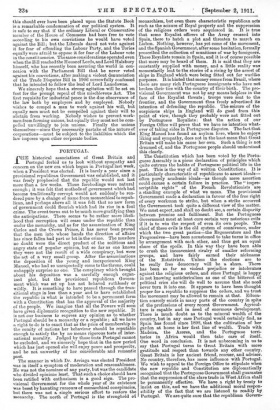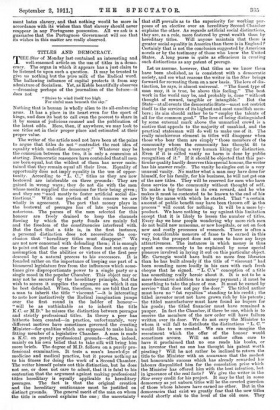PORTUGAL. r HE historical associations of Great Britain and Portugal forbid
us to look without sympathy and concern on the new era which began in Portugal last week, when a President was elected. It is barely a year since a provisional republican Government was established, and it was freely prophesied that the republic would not last more than a few weeks. These forebodings were natural enough ; it was felt that methods of government which had become traditionally corrupt would not suddenly be ren- dered pure by a change of name from monarchical to repub- lican, and perhaps above all it was felt that no new form of government could flourish which had its rise in a foul crime. The event turns out to be much more gratifying than the anticipations. There seems to be rather more likeli- hood that corruption will cease under the republic than under the monarchy, and as for the assassination of King Carlos and the Crown Prince, it has never been proved that the men into whose hands the direction of affairs has since fallen had part or lot in the crime. The murders no doubt were the direct product of the seditious and angry state of popular opinion, but so far as one knows they were not the result of a wide conspiracy, but were the act of a very small group. After the assassinations the deposition of the young and inexperienced King Manoel, who had so unexpectedly come to the throne, could unhappily surprise no ono. The conspiracy which brought about his deposition was a carefully enough organ- ized plot, but the provisional republican Govern- ment which was set up has not behaved ruthlessly or wildly. It is something to have passed through the tran- sitional stage in less than a year and to have established the republic in what is intended to be a permanent form with a Constitution that has the approval of the majority of the people. We imagine that all the Powers will soon have given diplomatic recognition to the new republic. It is not our business to express any opinion as to whether Portugal should be a monarchy or a republic ; all we have a right to do is to exact that as the price of membership in the comity of nations her behaviour should be reputable enough to satisfy the by no means rigorous tests of inter- national morality. Judged by those tests Portugal cannot be excluded, and we sincerely hope that in the new period which has just opened she will enjoy peace and prosperity, and be not unworthy of her considerable and romantic past. The manner in which Dr. Arriaga was elected President was in itself a symptom of moderation and reasonableness. He was not the nominee of any party, but was the candidate who divided opinions least. That such a choice should have been ratified with enthusiasm is a good sign. The pro- visional Government for the whole year of its existence was beset by haunting rumours of monarchical conspiracies, but there was not a single serious effort to restore the monarchy. The north of Portugal is the stronghold of monarchism, but even there characteristic republican acts such as the seizure of Royal property and the suppression of the religious orders were acquiesced in. It is true that some Royalist officers of the Army crossed into Spain, there to hatch a plot and threaten to march on Lisbon. Nothing, however, has yet come of the movement, and the Spanish Government, after some hesitation, formally proscribed the collection of munitions of war by foreigners. These Royalists remain in Spain, and it is of course possible that more may be heard of them. It is said that they are constantly supplied with money, and a little reality was momentarily lent to the stories of a rising by the arrest of ships in England which were being fitted. out for warlike purposes. It is hinted that money comes from Brazil, where there are many rich Portuguese immigrants who have not broken their ties with the country of their birth. The pro- visional Government was not by any means helpless in the face of the Royalist threats ; troops were sent to the frontier, and the Government thus freely advertised its intention of defending the republic. The seizure of the suspicious ships in England will do good from this point of view, though they probably were not fitted out by Portuguese Royalists : that the action of our Foreign Office will prove that we have no intention what- ever of taking sides in Portuguese disputes. The fact that King Manoel has found an asylum here, where he enjoys liking and sympathy, does not in the least mean that Great Britain will make his cause her own. Such a thing is not dreamed of, and the Portuguese people should understand this clearly.
The Constitution which has been voted by the Portu- guese Assembly is a pious declaration of principles which quite outruns the habits of Portuguese political life in the past. This is the way of all written Constitutions. It is particularly characteristic of republicans to assert ideals— often purely academic ideals—as though mere assertion could excuse a certain failure in practice. The " impre- seriptible rights " of the French Revolutionists are a standing example of what we mean. The provisional Government made a declaration in favour of the free right of every workman to strike, but when a strike occurred the Government took quite a, different view of the matter. We must expect, and shall no doubt see, a certain disparity between promise and fulfilment. But the Portuguese Government must at least cure certain very notorious evils if it is to win the respect of even its own people. The chief of these evils is the old system of connivance, under which the two great parties—the Regenerators and the Progressives—have been accustomed to take turns in office by arrangement with each other, and thus get an equal share of the spoils. In this way they have been able to crush the inconvenient rivalry of smaller reforming groups, and have fairly earned their nickname of the Rotativists. Unless the elections are to be really free democracy will be a sham. There has been so far no violent prejudice or intolerance against the religious orders, and since Portugal is happy in not knowing anticlericalism as one of the bitterest of political cries she will do well to assume that she need never turn it into one. It appears to have been thought proper for a republic to suppress the orders, and we trust the movement may be allowed to remain at that. Educa- tion scarcely exists in many parts of the country in spite of the professions of every recent Government. Agricul- ture is capable and in need of enormous development. There is much doubt as to the mineral wealth of the country, but in any ease Portugal would certainly find, as Spain has found since 1898, that the cultivation of her garden at home is her first line of wealth. Trade with Madeira, the Azores, and the Portuguese terri- tories in Africa would then take care of itself. One word in conclusion. It is not unbecoming in us to say that Portugal turns to Great Britain with more gratitude and respect than towards any other country. Great Britain is her ancient friend, rescuer, and adviser. No country, therefore, has more influence with Portugal. We wish to appeal to the Foreign Office to stipulate when the new republic and Constitution are diplomatically recognized that the Portuguese Government shall guarantee that the suppression of the slave trade in West Africa shall be permanently effective. We have a. right by treaty to insist on this, and we have the additional moral respon- sibility of the fact that we are listened to readily by Portugal. We are quite sure that the republican Govern- ment hates slavery, and that nothing would be more in accordance with its wishes than that slavery should never reappear in any Portuguese possession. All we ask is a guarantee that the Portuguese Government will see that its wishes in this matter are really observed.







































 Previous page
Previous page